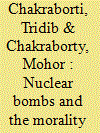| Srl | Item |
| 1 |
ID:
133472


|
|
|
|
|
| Publication |
2014.
|
| Summary/Abstract |
Within Japan, the atomic bombing of Hiroshima is understood as a national experience that sets the country apart from nations that have been spared such devastation. A special phrase the Japanese use to describe their country is yuitsu hibaku kokka, 'the only country that has experienced atomic bombing'. This phrase has become a powerful cliché for depicting Japan to a national and international audience. Even though Hiroshima was the experience of a comparatively small group before it spread to a larger collectivity, its transformation into a collective experience is regarded as a natural outcome, explained by the devastating nature of the event. This perspective, however, does not fully explain why people who have different war experiences unconditionally accept as their own experiences ones which they have not personally suffered. This article aims to clarify the process by which the Hiroshima experience was nationalised, and the period of its nationalisation. It also examines whether this transformation means that Hiroshima has become a 'trauma for everybody'. This is achieved through the application of Jeffrey C. Alexander's work on the transformation of Holocaust memories into a collective trauma.
|
|
|
|
|
|
|
|
|
|
|
|
|
|
|
|
| 2 |
ID:
145893


|
|
|
|
|
| Summary/Abstract |
The atomic bombing of Hiroshima and Nagasaki, led by the US in August 1945, remains the most brutal insignia of the Second World War. Seventy-one years after this incident, the recent visit of the US President, Barack Obama to the Hiroshima War Memorial has resurrected several issues related to the apocalyptic bombings, foremost among which is the question of a pending apology by the perpetrators of this ‘crime against humanity’. The devastating consequences of the use of nuclear weapons in war cannot be justified on moral grounds, in keeping with which, the International People’s Tribunal (2007) has declared the twin bombings as both a ‘war crime’ and a ‘crime against humanity’. Although President Obama espouses a world free of nuclear weapons, their complete elimination seems too far-fetched and utopian, at least in the short-term. Fortunately, the existence of mechanisms to prevent non-proliferation could contribute towards checking the increase in nuclear stockpiles and facilitate steps towards greater international peace and security.
|
|
|
|
|
|
|
|
|
|
|
|
|
|
|
|